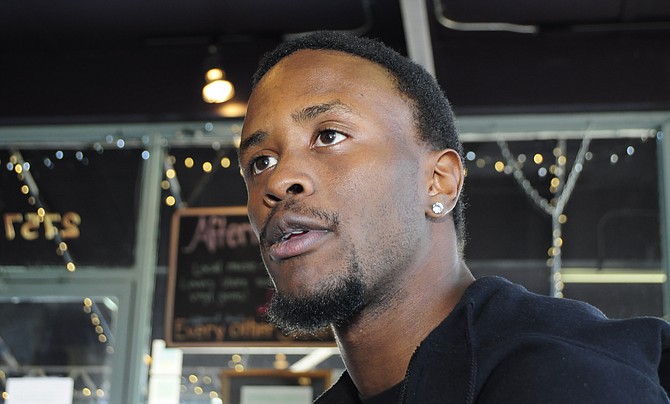Byron Johnson, 22, works at a McDonald’s in Jackson and says earning minimum wage allows him to barely scrape by. He recently joined a national campaign to pay fast-food workers $15 per hour and plans to participate in a Dec. 4 strike. Photo by Trip Burns.
When Byron Johnson applied for his job at a McDonald's in Jackson five months ago, it wasn't because he was so lacking in work experience that fast-food employment was the best he could hope for. Johnson, 22, brought a range of skills he picked up working in construction and landscaping and at the Jackson Country Club, where his grandmother was a housekeeping supervisor. And in the course of one shift, Johnson, who grew up in Jackson and Carthage, may do maintenance, operate the front cash register or work the grill.
Despite his experience and generally pleasant, positive demeanor, Johnson's starting hourly salary was—and remains—$7.25 per hour.
"I can't complain about me (not) having a job, but the way I go in and present myself for my work, I feel like I deserve more than that," Johnson said recently.
Some days, Johnson said the conditions he works under makes him feel defeated. In addition to the quick pace that fast-food restaurants promise their customers, he says certain managers seem to enjoy humiliating workers when customers are present.
One day, Joshua Dedmond, a union organizer, observed this treatment and told Johnson that he didn't have to put up with it. Eventually, Dedmond recruited Johnson to be one of the first workers in Jackson to join a national campaign for a $15-per-hour fast-food wage. It began with hundreds of striking fast-food workers in New York shortly after Thanksgiving in November 2012. Today, the campaign for $15 has spread to 150 cities and 33 countries. City councils in Seattle and San Francisco have raised the minimum wage to $15 in those cities.
The minimum wage has been a flashpoint for politicians in recent years. In response to President Barack Obama's proposal to raise the federal minimum to $10.10 per hour, the libertarian Cato Institute, in a paper published this summer, called raising the minimum wage "a particularly blunt instrument to use to deal with the very real problem of stagnating incomes among the working class."
Furthermore, report authors Logan Albright and Ike Brannon conclude that raising the minimum wage would hurt people who typically gravitate toward low-wage work.
"By reducing employment for students—many of whom are presumably in their first job—it runs the risk of exacerbating labor-market problems a few years down the road by making it harder for many would-be entry-level workers to learn the dos and don'ts of the workaday world.
It also prevents them from building a resume and skill set that will appeal to future employers after they leave school and are more likely to be supporting a family," the authors wrote.
The Obama administration has gone on the offensive, putting out information through the U.S. Department of Labor extolling the benefits of raising the minimum wage. Labor department research reviewed more than 60 studies on minimum-wage increases, finding "no discernible effect on employment."
"Minimum-wage increases have little to no negative effect on employment as shown in independent studies from economists across the country. Academic research also has shown that higher wages sharply reduce employee turnover which can reduce employment and training costs," DOL information shows.
The Mississippi Economic Policy Center also determined in 2012 that the state's $7.25 minimum wage is "substantially below the $12.63 per hour that one Mississippi worker needs to cover their basics and have modest savings."
"Mississippi's workers earning minimum wage have to work more hours to cover important expenses like child care and university tuition than they did two decades ago," MEPC analyst Sarah Welker wrote in June 2012.
She continued: "Covering all these costs is increasingly out of reach for those earning amounts near the minimum wage and beyond. These findings underscore both the importance of public supports and programs that reduce these expenses for families and initiatives that move more working adults to quality-wage employment."
Although Johnson went to work for McDonald's thinking he would work a full-time, 40-hour week, he said he is usually scheduled for half that amount.
He would like to take his girlfriend, Shateque, to the movies, but his $260 biweekly paycheck is only enough to help his grandmother with utilities and groceries for the household.
That sum could be reduced even further should Johnson's cash register ever come up short; he said employees whose cash registers are short must replace missing money or be terminated.
But Johnson doesn't want to earn a higher wage to lavish gifts on his significant other or even to purchase a car for himself; he catches rides to work either from Dedmond, the labor organizer, or his aunt.
He's more concerned with helping his grandmother replace furniture they had to discard after finding bedbugs.
"My grandma needs a lot of help. By me going to work every day, even making this minimum wage, if that's to help her, I'm down with that. But I could do a lot more if minimum wage did go up," said Johnson, who teaches Sunday School and plans to attend Tougaloo College next year.
The Jackson area's first strike in the push for a $15 minimum wage is planned for Thursday, Dec. 4, at the McDonald's at Hanging Moss Road and Northside Drive. It will likely be a small gathering, but Johnson is excited about helping to grow and help lead the effort in Mississippi.
Johnson said obtaining $15 per hour is just the first step.
"I feel like I'm worth more than $15; I'd say (I'm worth) about $25 an hour," he laughs.
"But $15, that's still reasonable. I could have a better chance at living."


